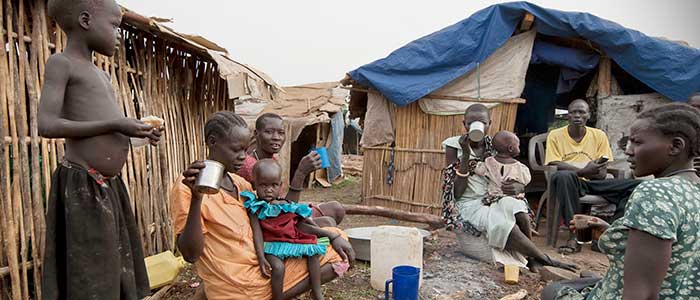Web_SouthSudan_iStock_000061842024_Large.jpg

People in displaced persons camp in Juba, South Sudan
The new clashes will stoke fears that a tenuous peace deal agreed in August 2015 will fail, reigniting the conflict which begin in 2013.
Governments from around the world and the United Nations have condemned the violence, which erupted last Thursday and Friday as the country prepared to celebrate its fifth year of independence from Sudan on 9 July.
While independence day passed largely without incident, Sunday and Monday saw further clashes, leaving many concerned that the country could be plunged back into civil war.
The reason the fighting broke out is unclear. A spokesman for rebel forces has claimed government troops attacked a rebel base, while the government’s information minister, Michael Makuei Leuth, told the BBC that rebel forces had attacked government soldiers at a check point.
The United Nations mission in South Sudan, UNMISS, is said to be outraged after its compounds, which shelter South Sudanese civilians looking for protection from the conflict, came under fire from small and heavy weapons, injuring a number of people.
Ellen Margrethe L![]() j, the special representative of the secretary-general and head of UNMISS, called on all parties to cease hostilities and “avoid the mistakes of the past”.
j, the special representative of the secretary-general and head of UNMISS, called on all parties to cease hostilities and “avoid the mistakes of the past”.
The UN Security Council has called on president Salva Kiir, who commands government troops, and newly reinstated vice president Riek Machar, who commands the rebels, to do their “utmost to control their respective forces”.
According to a statement from the UN: “Members of the security council urged an immediate end to the fighting by all concerned and demanded president Kiir and vice president Machar urgently prevent the spread of violence, and genuinely commit themselves to the full and immediate implementation of the peace agreement.”
It noted that this includes the enforcement of a permanent ceasefire and the redeployment of military forces from Juba. The two sides have also failed so far to integrate their armies.
The US has pulled all non-emergency personnel from the US embassy in Juba and also called on the power-sharing government, formed between the two sides in April, to accelerate the implementation of the peace agreement.
“Sustained cooperation, engagement, and reform to confront the country’s grave challenges are essential to avoid a return to widespread conflict,” according to a statement by the US State Department.
Last week, Oxfam also called for quicker implementation of the peace agreement, in particular, its economic requirements.
Two years of civil war, the collapse of oil production, low prices and years of poor management have sent the country’s economy into crisis and inflation skyrocketing to almost 300%.
The civil war, which broke out in 2013, was conducted largely along ethnic lines. It saw tens of thousands of people killed, millions driven from their homes, and further entrenched severe poverty in the world’s youngest country.













